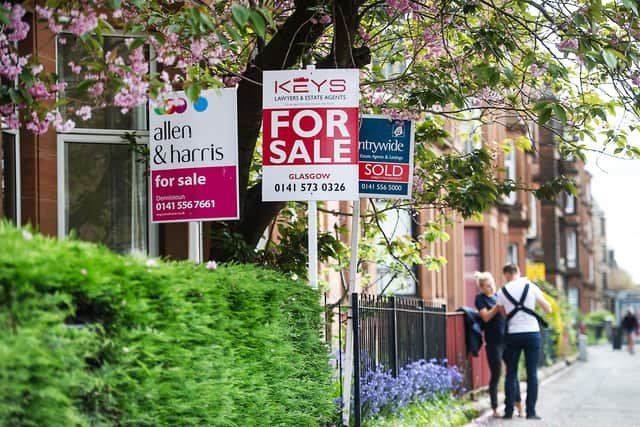Scotland needs to level the taxation playing field - David Alexander
The latest figures show that property taxes in Scotland, raised through the Land and Buildings Transaction Tax (LBTT) totalled £616.6m in the 12 months to February 2024.
While this is slightly lower than the same period in 2022/23 when £623.0m was raised it is £212.8m (52.7 per cent) higher than the pre-pandemic figure of £403.8m in 2019/20.
Advertisement
Hide AdAdvertisement
Hide AdAlmost all the taxes raised arose from properties sold for more than £325,001. The 16,350 transactions above this threshold raised £349.2m which is 82.7 per cent of the total £422m raised in LBTT (this is the figure for residential sales with the ADS figures removed). This means that the average tax levied per transaction was £21,357.


If these buyers were to purchase their home in England, then they would not start to pay property tax of 10 per cent until the value of their property was greater than £925,000. By contrast, in Scotland, a home costing £325,001 is the starting point for the 10 per cent levy.
Furthermore, 12 per cent is charged on properties selling for more than £750,000 whereas south of the Border this level does not kick in until prices reach £1.5m. It is clear, therefore, that Scottish homebuyers are being charged considerably more in tax for the privilege of owning a home north of the Border.
Interestingly, of the £616.6m taxes raised £194.6m is from the additional dwelling supplement (ADS) which is charged on second homes and properties purchased by landlords and property investors to rent. This is 31.6 per cent of the total raised and is £40.4m higher than the same period in 2022/23.
It is unclear what the breakdown of sales between second homeowners and property investors is but the number of second homeowners in Scotland has fallen 40.7 per cent since its peak of 40,599 in 2012 dropping to 24,061 in 2023.


This substantial increase in purchases by investors, landlords and second homeowners indicate a considerable confidence in the Scottish market. Given the punitively high taxation paid by this group of buyers it is testament to their resilience and belief in the Scottish market that they are buying properties in ever larger numbers because they want to invest in the private rented sector, or they wish to have a second home here. Either way they are contributing substantial levels of tax to the Scottish purse and should be encouraged to invest more in the future.
Of course, nobody can predict whether this will continue. There are already reports that it is becoming increasingly difficult to attract high quality applicants for certain jobs due to the much higher rates of personal taxation in Scotland and it will naturally follow that if the better paid don’t come then the housing market will be impacted.
We need to ensure that Scotland is an attractive place to work, live, and invest in if the economy is to grow in the future. Fair taxation, whether personal or on property, plays a key role in maintaining our country’s appeal. Ensuring Scotland is competing on a level playing field is surely the minimum that can be asked if the economy is to grow, and the country is to flourish.
David Alexander is CEO of DJ Alexander Scotland Ltd
Comments
Want to join the conversation? Please or to comment on this article.